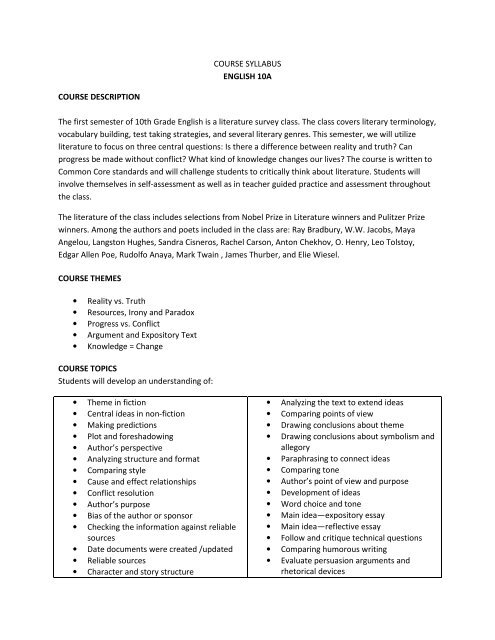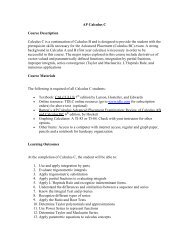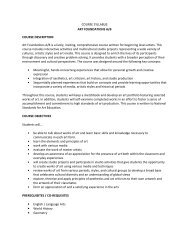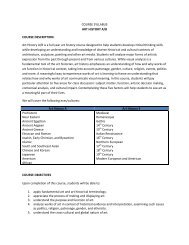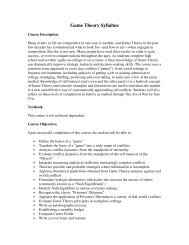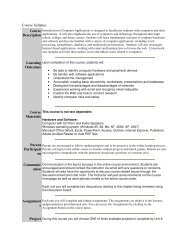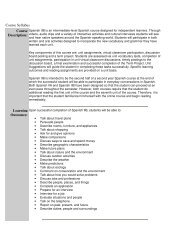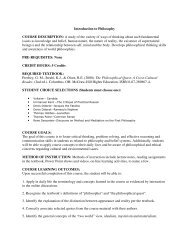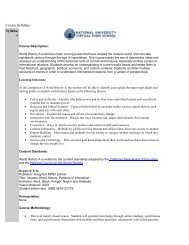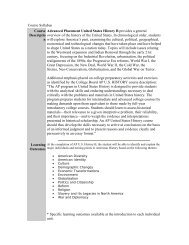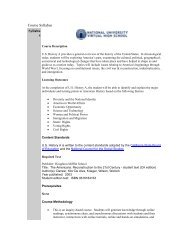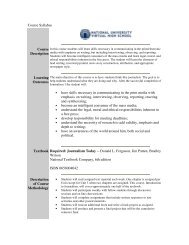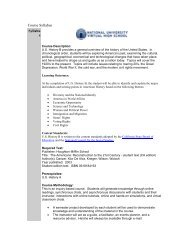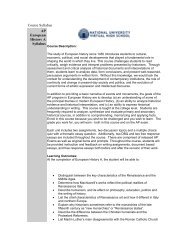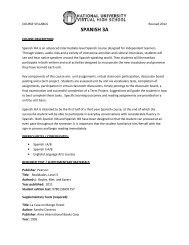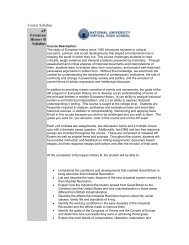COURSE SYLLABUS ENGLISH 10A COURSE DESCRIPTION The ...
COURSE SYLLABUS ENGLISH 10A COURSE DESCRIPTION The ...
COURSE SYLLABUS ENGLISH 10A COURSE DESCRIPTION The ...
Create successful ePaper yourself
Turn your PDF publications into a flip-book with our unique Google optimized e-Paper software.
<strong>COURSE</strong> <strong>SYLLABUS</strong><br />
<strong>ENGLISH</strong> <strong>10A</strong><br />
<strong>COURSE</strong> <strong>DESCRIPTION</strong><br />
<strong>The</strong> first semester of 10th Grade English is a literature survey class. <strong>The</strong> class covers literary terminology,<br />
vocabulary building, test taking strategies, and several literary genres. This semester, we will utilize<br />
literature to focus on three central questions: Is there a difference between reality and truth? Can<br />
progress be made without conflict? What kind of knowledge changes our lives? <strong>The</strong> course is written to<br />
Common Core standards and will challenge students to critically think about literature. Students will<br />
involve themselves in self-assessment as well as in teacher guided practice and assessment throughout<br />
the class.<br />
<strong>The</strong> literature of the class includes selections from Nobel Prize in Literature winners and Pulitzer Prize<br />
winners. Among the authors and poets included in the class are: Ray Bradbury, W.W. Jacobs, Maya<br />
Angelou, Langston Hughes, Sandra Cisneros, Rachel Carson, Anton Chekhov, O. Henry, Leo Tolstoy,<br />
Edgar Allen Poe, Rudolfo Anaya, Mark Twain , James Thurber, and Elie Wiesel.<br />
<strong>COURSE</strong> THEMES<br />
• Reality vs. Truth<br />
• Resources, Irony and Paradox<br />
• Progress vs. Conflict<br />
• Argument and Expository Text<br />
• Knowledge = Change<br />
<strong>COURSE</strong> TOPICS<br />
Students will develop an understanding of:<br />
• <strong>The</strong>me in fiction<br />
• Central ideas in non-fiction<br />
• Making predictions<br />
• Plot and foreshadowing<br />
• Author’s perspective<br />
• Analyzing structure and format<br />
• Comparing style<br />
• Cause and effect relationships<br />
• Conflict resolution<br />
• Author’s purpose<br />
• Bias of the author or sponsor<br />
• Checking the information against reliable<br />
sources<br />
• Date documents were created /updated<br />
• Reliable sources<br />
• Character and story structure<br />
• Analyzing the text to extend ideas<br />
• Comparing points of view<br />
• Drawing conclusions about theme<br />
• Drawing conclusions about symbolism and<br />
allegory<br />
• Paraphrasing to connect ideas<br />
• Comparing tone<br />
• Author’s point of view and purpose<br />
• Development of ideas<br />
• Word choice and tone<br />
• Main idea—expository essay<br />
• Main idea—reflective essay<br />
• Follow and critique technical questions<br />
• Comparing humorous writing<br />
• Evaluate persuasion arguments and<br />
rhetorical devices
• Making inferences in character and<br />
characterization<br />
• Making inferences in setting<br />
• Evaluate analytic and interpretive essays<br />
LEARNING OUTCOMES<br />
Upon successful completion of this class, students will be proficient in the following Common Core<br />
Standards for grade 10:<br />
1. Reading Literature (RL)- 1, 2, 3, 4, 5, 6, 10<br />
2. Reading Informational Text (RI)-2, 3, 4, 5, 6, 7, 8, 9, 10<br />
3. Writing (W)- 1, 1a, 1b, 1c, 1d, 1e, 2, 2a, 2b, 2c, 2d, 2e, 2f, 3, 3a, 3b, 3c, 3d, 3e, 4, 5, 7, 8, 9,<br />
9a,9b, 10<br />
4. Speaking and Listening (SL) 1, 1a, 1b, 1c, 1d, 2, 3, 4, 5, 6<br />
5. Language (L) 1, 1a, 1b,2, 2c, 3, 4, 4a, 4b, 4c, 4d, 5, 5b, 6<br />
See for full text of standards:<br />
http://www.scoe.net/castandards/agenda/2010/ela_ccs_recommendations.pdf<br />
PRE-REQUISITES / CO-REQUISITES<br />
• English 9 A/B<br />
• World History A<br />
Primary Text:<br />
This course requires the novel:<br />
<strong>The</strong> Grapes of Wrath by John Steinbeck<br />
Supplementary Materials:<br />
Notebook<br />
Supplies for course project (will vary)
<strong>COURSE</strong> METHODOLOGY<br />
This is an inquiry-based course where you will discover and utilize knowledge of English / Language Arts<br />
via the lectures, videos, and other readings, and class discussions with other students and the instructor.<br />
Acting as a facilitator, your instructor will guide you through the process; however, as the learner, you<br />
are responsible for actively acquiring and constructing knowledge by completing all assigned readings<br />
and activities.<br />
Both formal and informal assessment will be used in evaluating your performance throughout the<br />
course. Informal assessment will include an evaluation of the quality and timeliness of your participation<br />
in class activities. Formal assessment will involve multiple-choice quizzes, written essays, major writing<br />
assignments, a midterm, a final exam and a course project.<br />
<strong>COURSE</strong> PARTICIPATION OBJECTIVES<br />
This course for which you are registered is a college preparatory, academically rigorous course that<br />
covers a semester’s worth of material . As such, it is important that you adhere to the following<br />
guidelines as you manage your time and commit to successfully completing all required coursework:<br />
1. <strong>The</strong> requirements for this course are equivalent to completion of minimum of 90+ hours of class<br />
instruction at a traditional on-site high school.<br />
2. Assignments must be submitted for each unit as they are completed so that the teacher may<br />
review and assess your performance. Do not hold your work, you must submit each unit’s<br />
homework as it is completed, demonstrating weekly assignment completions.<br />
3. You participate regularly in your course to demonstrate not only continued participation, but<br />
also completion of all course requirements, including assignments, assessments and class<br />
discussion forums.<br />
4. You must complete your individual work and any incident of suspected cheating, plagiarism or<br />
collaboration on assignments violates the academic integrity expectations outlined at the time<br />
of your enrollment and can result in failure of the course or further action as deemed<br />
appropriate.<br />
<strong>COURSE</strong> OUTLINE<br />
English <strong>10A</strong><br />
Unit Unit Title Assignments / Activities<br />
1 Reality vs. Truth Part 1 Introduction: <strong>The</strong> Big Question: Is there a difference<br />
between reality and truth?<br />
Lecture 1: Truth and Reality
Lecture 2: Plot Structure and Foreshadowing / Flashback<br />
Lecture 3: Author’s Perspective<br />
Vocabulary Interactivity<br />
Readings:<br />
• <strong>The</strong> Monkey’s Paw by W.W. Jacobs<br />
• <strong>The</strong> Leap by Louise Erdrich<br />
• Swimming to Antarctica by Lynne Cox<br />
• Occupation Conductorette from I Know Why the<br />
Caged Bird Sings by Maya Angelou<br />
Assignments include:<br />
• Literary Analysis<br />
• Vocabulary<br />
• Latin and Greek Roots<br />
• Vocabulary Acquisition and Use<br />
• Word Study<br />
• Conventions Practice<br />
• Narrative Text Writing Assignment<br />
• Speaking and Listening Activities<br />
• Reading Skills<br />
• Abstract and Concrete Nouns<br />
• Explanatory Text<br />
Class Discussion<br />
Project Introduction<br />
<strong>The</strong> Grapes of Wrath<br />
• Chapters 1-5<br />
• Activities<br />
2 Reality vs. Truth Part 2 Introduction: Continuing the Discussion: Is there a<br />
Difference Between Reality and Truth?<br />
Lecture 1: Writer’s style<br />
Lecture 2: Conflict Resolution<br />
Lecture 3: Author’s Purpose<br />
Vocabulary Interactivity<br />
Readings:<br />
• Feel the City’s Pulse? It’s Be-Bop Man! By Ann<br />
Douglass<br />
• <strong>The</strong> Newsletter for the Healdsburg Jazz Festival<br />
• Marian Anderson, Famous Concert Singer by<br />
Langston Hughes
• Tepeyac by Sandra Cisneros<br />
• Contents of a Dead Man’s Pocket by Jack Finney<br />
• <strong>The</strong> Marginal World by Rachel Carson<br />
Assignments Include:<br />
• Key ideas and details<br />
• Synonyms<br />
• Comparisons<br />
• Writing style<br />
• External conflicts<br />
• Suspense<br />
• Reading Skills<br />
• Cause and Effect<br />
• Vocabulary Acquisition and Use<br />
• Word Study<br />
• Pronouns<br />
• Writing—Narrative Text<br />
• Literary Analysis<br />
• Antonyms<br />
• Conventions<br />
• Writing—Explanatory Text<br />
• Research and Technology<br />
Timed Writing: Argument Essay<br />
Timed Writing: Explanatory Essay<br />
Class Discussion<br />
3 Resources, Irony and<br />
Paradox<br />
Grapes of Wrath<br />
• Chapters 6-9<br />
• Activities<br />
Introduction: Informational Texts<br />
Lecture 1: Irony<br />
Interactive Vocabulary<br />
Readings:<br />
• Egyptology Resources<br />
• Texts from the Pyramid Age<br />
• <strong>The</strong> Interactive Dig<br />
• Like the Sun, Truth<br />
• <strong>The</strong> Open Window<br />
Assignments Include:
• Comparing Functional and Expository Texts<br />
• Vocabulary<br />
• Irony and Paradox<br />
Timed Writing: Explanatory Text Essay<br />
Timed Writing: Explanatory Text Essay<br />
Class Discussion<br />
Benchmark Assessment 1<br />
Grapes of Wrath<br />
• Chapters 10 – 13<br />
• Activities<br />
4 Progress vs. Conflict Part<br />
1<br />
Introduction: Big Question: Can Progress be Made without<br />
Conflict?<br />
Lecture 1: Conflict<br />
Lecture 2: Characterization<br />
Lecture 3: Literary Analysis<br />
Lecture 4: Reading Skills<br />
Vocabulary Interactivity<br />
Readings:<br />
• A Visit to Grandmother by William Melvin Kelley<br />
• A Problem by Anton Chekhov<br />
• <strong>The</strong> Street of the Canon by Josephina Niggli<br />
• <strong>The</strong>re Will Come Soft Rains by Ray Bradbury<br />
Assignments Include:<br />
• Using details from the story<br />
• Characterization<br />
• Making inferences<br />
• Vocabulary Acquisition and Use<br />
• Reading Skill<br />
• Literary Analysis<br />
• Sentence Context<br />
• Conventions: Principal Parts of Regular Verbs<br />
• Writing—Narrative Text<br />
• Setting<br />
• Word Study<br />
• Irregular Verbs<br />
• Writing—Argumentative Text
Class Discussion<br />
Grapes of Wrath<br />
• Chapters 14-19<br />
• Activities<br />
5 Progress vs. Conflict Part 2 Introduction: Continuing the Discussion: Can Progress be<br />
Made Without Conflict?<br />
Lecture 1: Comparing Points of View<br />
Lecture 2: <strong>The</strong>me<br />
Lecture 3: Reading Skill: Drawing Conclusions<br />
Lecture 4: Symbolism and Allegory<br />
Vocabulary Interactivity<br />
Readings:<br />
• Tides by Joseph D. Exline, Ed D<br />
• NASA News: Black Water Turns the Tide of Florida<br />
Coral by Jay M. Pasachoff<br />
• One thousand Dollars by O, Henry<br />
• By the Waters of Babylon by Stephen Vincent<br />
Benet<br />
• How Much Does a Man Need by Leo Tolstoy<br />
• Civil Peace by Chinua Achebe<br />
• <strong>The</strong> Masque of Red Death by Edgar Allan Poe<br />
• <strong>The</strong> Garden of Stubborn Cats by Italo Calvino<br />
Assignments Include:<br />
• Comparing Expository Texts<br />
• Comparing Points of View<br />
• Literary Analysis<br />
• Vocabulary Acquisition and Use<br />
• Word Study<br />
• Reading Skills<br />
• Action and Linking Verbs<br />
• Writing Explanatory Text<br />
• Passive Voice<br />
• Writing—Narrative Text<br />
Timed Writing: Analytical Essay<br />
Timed Writing: Explanatory Essay<br />
Class Discussion<br />
Grapes of Wrath
• Chapters 20-21<br />
• Activities<br />
6 Arguments and<br />
Expository Text<br />
Introduction to analyzing arguments and expository texts<br />
Lecture 1: Paraphrasing<br />
Lecture 2: Comparing Tone<br />
Vocabulary Interactivity<br />
Readings:<br />
• Editorial on the Anniversary of the Fall of the Berlin<br />
Wall<br />
• Voices from the Wall<br />
• <strong>The</strong> Censors by Luis Valenzuela<br />
• <strong>The</strong> Leader in the Mirror by Pat Mora<br />
Assignments Include:<br />
• Argumentative and Expository Text<br />
• Comparing Tones<br />
Timed Writing: Response to Literature<br />
Timed Writing: Argumentative Text<br />
Class Discussion<br />
Benchmark Assessment 2<br />
Grapes of Wrath<br />
• Chapters 22 – 24<br />
• Activities<br />
7 Knowledge = Change Part 1 Introduction: <strong>The</strong> Big Question: What Kind of Knowledge<br />
Changes Our Lives?<br />
Lecture 1 : Essays<br />
Lecture 2: Types of Essays<br />
Lecture 3: Tone and Word Choice<br />
Vocabulary Interactivity<br />
Readings:<br />
• <strong>The</strong> Spider and the Wasp by Alexander<br />
Petrunkevitch<br />
• Longitude by Dava Sobel
• <strong>The</strong> Sun Parlor by Dorothy West<br />
• From In Commemoration: One Million Volumes by<br />
Rudolfo Anaya<br />
Assignments Include:<br />
• Literary analysis expository essay<br />
• Reading Skills<br />
• Vocabulary Acquisition and Use<br />
• Word Study<br />
• Writing Expository Essay<br />
• Conventions<br />
• Writing a business letter<br />
• Speaking and Listening Comprehension and<br />
Collaboration<br />
Class Discussion<br />
Grapes of Wrath<br />
• Chapter 25-26<br />
• Activities<br />
8 Knowledge = Change Part 2 Introduction: functional texts, humorous speeches, and<br />
essays<br />
Lecture 1: Technical Directions<br />
Lecture 2: Humorous Speeches<br />
Lecture 3: Persuasive Writing and Rhetorical Devices<br />
Vocabulary Interactivity<br />
Readings:<br />
• How to Use a Compass<br />
• GPS Quickstart Guide<br />
• A Toast to the Oldest Inhabitant: <strong>The</strong> Weather of<br />
New England by Mark Twain<br />
• <strong>The</strong> Dog that Bit People by James Thurber<br />
• Keep Memory Alive by Elie Wiesel<br />
• Nobel Lecture by Alexander Solzhenitsyn<br />
Assignments Include:<br />
• Comparing functional texts<br />
• Comparing humorous writing<br />
• Persuasive Writing and Rhetorical Devices<br />
• Reading Skills—evaluating persuasion<br />
• Vocabulary Acquisition and Use<br />
• Word Study<br />
• Literary Analysis
Timed Writing: Argumentative Text<br />
Timed Writing: Explanatory Text Essay<br />
Class Discussion<br />
Benchmark Assessment 3: Final Exam<br />
Grapes of Wrath<br />
• Finish reading the novel<br />
• Final Essay<br />
9 Course Project All students are required to complete a course project and<br />
it is recommended that students work on their course<br />
projects each week. <strong>The</strong> final project will be due at the end<br />
of the course.<br />
<strong>COURSE</strong> PROJECT OPTIONS<br />
English 10 A<br />
Students will choose one project from the list below:<br />
1. Photo Gallery: Find Depression-era photographs of rural farm workers, as in the work of Walker<br />
Evans and Dorothea Lange. Look for photos of contemporary migrant workers in the United States<br />
from recent periodicals. Try to find pairs of photos that echo or contrast with each other in subject<br />
or spirit. Be able to discuss the photographs you show, and point to details that explain why you<br />
chose them. Create a presentation to exhibit this “gallery” and submit it to both the dropbox for<br />
credit.<br />
2. Explore the historical period of the 1930s by creating posters that provide in-depth information<br />
on what was happening in the following artistic disciplines: music and jazz, theatre, painting and<br />
sculpture, photography, and dance. Submit these posters in the dropbox for credit.<br />
3. Write a scene in which you put Tom Joad on trial for murdering a man with a pick handle. Write<br />
the dialogue and perform the parts of the characters who testify. <strong>The</strong> scene can be written or acted<br />
out in a presentation. Submit your final scene to the dropbox for credit.<br />
4. Write a newspaper article describing the eventual fates of any of the Joads alive at the novel’s<br />
end: Tom, Noah, Connie, Al, Ma, Pa, Rosasharn. Use your imagination but base your story on what<br />
you know about your subject from the novel. Submit your final article to the dropbox for credit.<br />
5. Imagine you are a government official reporting on the conditions of California migrant workers<br />
during the Depression. Write a report on what you find among the workers at one of the stops
along the Joads’ journey: Sallisaw, Santa Rosa, Needles, Bakersfield, Weedpatch, or the cotton<br />
camp. Explain the causes of the situation in your report and offer practical solutions.<br />
6. Host a screening of Nunnally Johnson and John Ford’s movie version of <strong>The</strong> Grapes of Wrath at<br />
your home with family and friends. Lead a discussion afterward about the novel and differences<br />
between the novel and the film. Develop a list of interview questions you will ask the attendees<br />
after the film (please get this list approved ahead of time by your instructor). Interview your friends<br />
and family. and summarize this experience. Submit all of your documentation to the dropbox for<br />
credit.<br />
ACADEMIC HONESTY<br />
<strong>The</strong> following are forms of academic dishonesty. <strong>The</strong>se practices will not be tolerated.<br />
Plagiarism: Plagiarism consists of using another author's words without proper<br />
identification and documentation of that author. Plagiarism takes the form of direct<br />
quotation without the use of quotation marks and/or documentation, or paraphrasing<br />
without proper identification and documentation. <strong>The</strong> fabrication of sources, or the act,<br />
deliberately or unconsciously, of passing another author's work off as your own are also<br />
considered to be plagiarism.<br />
Falsification: Falsification consists of deliberately changing results, statistics, or any<br />
other kind of factual information to make it suit your needs. It also consists of<br />
deliberately changing a source’s intent by misquoting or taking out of context.<br />
Multiple submission: If you wish to turn in the same work or use the same research, in<br />
whole or in part, for more than one course, you must obtain permission to do so from<br />
all instructors involved. Failure to obtain this permission constitutes academic<br />
dishonesty. This course is a chance for you to explore your own creativity.<br />
GRADING POLICY<br />
Final Grades for this class will be based on your performance, participation in all class activities, group<br />
discussions, unit assignments, course projects, and benchmark exams.<br />
HOW YOU WILL BE GRADED<br />
Grade<br />
A<br />
Skills<br />
Demonstrates excellence in grasping key concepts; critiques the work of others; provides<br />
ample evidence of support for opinions; readily offers new interpretations of discussion<br />
material.
B<br />
C<br />
D or F<br />
Shows evidence of understanding most of the major concepts; is able to agree or disagree<br />
when prompted; is skilled in basic level of support for opinions; offers an occasional<br />
divergent viewpoint.<br />
Has mostly shallow grasp of the material; rarely takes a stand on issues; offers inadequate<br />
levels of support.<br />
Shows no significant understanding of material.<br />
CLASS DISCUSSION RUBRIC<br />
Initial Posts<br />
Score 3 2 1 0<br />
Initial Response Response<br />
completely<br />
addresses the<br />
prompt with a<br />
well---<br />
developed<br />
paragraph of at<br />
least five<br />
to seven<br />
sentences.<br />
Response<br />
adequately<br />
addresses the<br />
prompt with a<br />
paragraph<br />
of five to<br />
seven sentences.<br />
Response<br />
somewhat<br />
addresses the<br />
prompt with a<br />
paragraph<br />
less than five to<br />
seven<br />
sentences.<br />
Responses to Classmates<br />
Response<br />
Does not<br />
Address the<br />
prompt.<br />
Or<br />
No response.<br />
Score 2 1 0<br />
Follow-up posts Responses are<br />
Thoughtful and create<br />
discussion.<br />
Responses only agree<br />
Or disagree with no<br />
Thoughtful discussion.<br />
No response given<br />
And:<br />
One response given<br />
to two classmates.<br />
And/or:<br />
Only one response to<br />
One classmate.<br />
*If there is more than one prompt, students must reply to all prompts. All prompts are worth a total of 5<br />
points. Scoring is detailed above.<br />
SCHOOLWIDE LEARNER EXPECTATIONS<br />
NUVHS students will be…
• Engaged Learners<br />
• Critical Thinkers<br />
• Effective Communicators<br />
• Global Citizens


